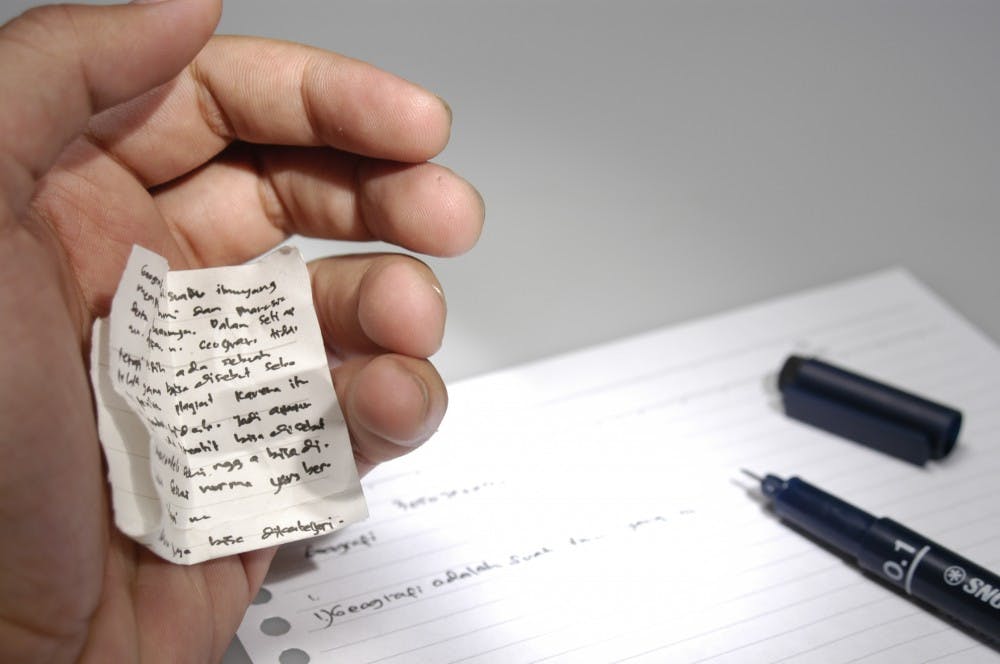
Photo by Hariadhi / CC BY-SA 3.0
A check sits on the desk of a basketball coach at a selective university. Next to it is an outstanding transcript and resume — these come from different students, different families, but he must choose one.
The whole country has thrown a fit of public outrage at millionaires’ attempts to steal educational opportunities using money. But, every single day, equally serious unethical, unfair advantages are being snatched by students right here on campus, aggravating the inequalities that education seeks to mitigate.
And at Penn, it’s flying under the radar.
Cheating is rampant, hidden, and must be treated as seriously as admissions-fixing. Felicity Huffman and Lori Loughlin used bribes to steal educational opportunities from deserving students who displayed a genuine and intense commitment to learning and academic endeavor. Penn students use their own selfishness to commit the same act of robbery.
Putting yourself ahead — whether through bribing coaches, doctoring resumes, or using unethical means to get extra time on exam — is destructive.
There were a staggering 210 academic integrity violations in the last academic year, according to Penn's Office of Student Conduct’s 2018 Annual Disciplinary Report. This includes plagiarism, altering of an exam for a re-grade, misconduct during an exam, and cheating. In 2017 to 2018, it was even worse. The 351 investigations found 227 violations, which had steadily increased from 2013.
The real, unreported rate of cheating at Penn exceeds this data without a doubt, but is restricted to anecdotal evidence. Most midterm and final exams are highly informal at Penn, compared to at most universities around the world, where exam conditions mean strict rules of conduct. For example, at the University of Cambridge in the United Kingdom, there is a strict set of rules for candidates, so that all proctors follow the same objective standards when supervising an exam. These rules include banning the possession of all electronic devices during the exam, having to immediately stop writing when instructed, and even banning food and drinks except for “a small bottle of non-carbonated drink.” Any breach of the rules can result in a fine of up to £175 ($232).

At Penn, teaching assistants usually can proctor in any way they wish. It is all too easy to keep a cellphone in your pocket and use the bathroom in the middle of an exam (put two and two together). When time is called, many students keep writing for many more minutes amidst the shuffling of handing in papers. I explained this system to a friend who attends university in Australia, and with utter surprise, she told me that in her classes, if she kept writing when time was up, her paper would be torn up right then and there.
And cheating can manifest in many more insidious ways.
An often overlooked violation of academic integrity is abuse of prescription drugs. The pill that helps you focus in class, pull an all-nighter, or even party longer without blacking out.
Aside from the dangerous health consequences of Penn’s Adderall addiction, it’s a serious problem in not only creating unfair advantages, but also perpetuating an environment of artificial hyper-competition where academic honesty must fall to the wayside for success. Twenty percent of Ivy League students abuse stimulants like Adderall to get ahead academically, according to a 2014 Pediatric Academics Society study.
This prescription-only drug is beneficial to those who have genuine struggles with concentration. It puts them on equal footing with peers who do not suffer from ADHD. For those who illegally pay $12 a pill to get ahead of the curve, it’s a cowardly spit in the face to both the students who genuinely need medication to focus and the students who use their own capacity to fairly achieve what they can. It’s no better than an athlete taking steroids. It’s no better than bribing athletics coaches to secure a spot at Penn.
Adderall use for cognitive enhancement has been reported in The Daily Pennsylvanian for decades. A 2004 column discussed student concerns over the unfair competitive advantage obtained from illegal use of these prescription drugs. Fifteen years later, this month, a columnist wrote about its negative effects.
Yet, it continues.
Penn must add illegal cognitive enhancement to its list of academic integrity violations, and encourage reporting of this behavior. More importantly, Penn must impose harsher sanctions for offenders for all types of violations.
Currently, it’s not hard to see why students are unconcerned about the ramifications of casual cheating. Of the students who were caught with a violation last year, 90 students had to write an essay as punishment, 86 students gained academic support, and 82 got a “reprimand.” Only two had their violation noted on their transcript, and three were suspended. With debates flowing at Penn about expelling students involved with the admissions scandal, the lack of regard for similar academic unfairness on campus is shocking.
Aside from punishment, Penn faculty can also assist on the prevention side. They must take more responsibility to write up new exams year-to-year, and consider that by curving grades, it is possible that “cheating turns into an arms race.”
Education should not be a competition, but resource constraints currently limit many schools’ opportunities into a zero-sum game. Without fair rules of this game, educational achievement loses its meaning, and our whole educational structure is in jeopardy. Those with the moral fiber to conform to rules, honesty, and integrity are punished and held back in a system without adequate rule-enforcement mechanisms, like a state with weak institutions descending into corruption.
Penn’s lax attitude in taking basic, concrete steps to protect academic integrity and fairness must change, especially considering its elite position in academia. Students and administrators are up in arms about the admissions scandal, but a basic look at our own and our peers’ everyday behavior can highlight the same issues that pervade campus every single day.

LUCY HU is a College junior from Auckland, New Zealand, studying Political Science. Her email address is lucyhu@sas.upenn.edu.
The Daily Pennsylvanian is an independent, student-run newspaper. Please consider making a donation to support the coverage that shapes the University. Your generosity ensures a future of strong journalism at Penn.
Donate




